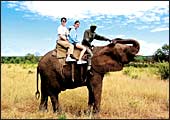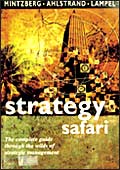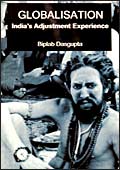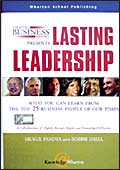 |
| A jumbo problem: It is easier to ride
an elephant than get a handle on strategy |
It's
no exaggeration to say that for every manager in the world, there's
a unique strategy. Which is why different companies perform differently
and even within the same organisation, all the managers don't
deliver equally. Why should that be the case when companies, at
least the better ones, recruit managers with comparable strategy
skill sets and operate in more or less the same environment? There's
no simple answer to it, but what it does point to is the complexity
involved in strategising. It really starts with some fundamental
issues, not least of which is the question, what is strategy?
To managers who talk strategy as naturally
as they breathe, that question may seem inane. But Henry Mintzberg,
Bruce Ahlstrand, and Joseph Lampel-all professors of management-don't
think the manager today really knows what strategy is, which one
of the strategic management 'schools' to follow, or whether it
is at all possible to strategise in the insouciant sense of the
word. A large part of the problem, the authors contend in this
first India reprint of their 1998 book by Pearson, is due to the
sheer volume of work available in the area of strategic management.
Hence, the analogy of strategy as an elephant and managers as
the seven blind men trying to make sense of the beast.
 |
STRATEGY SAFARI
By Henry Mintzberg, Bruce Ahlstrand and Joseph Lampel
Pearson
PP: 406
Price: Rs 808 |
Before we go further along the review, a quick
note on why we are giving so much prominence to a seven-year-old
book. One reason has to do with Mintzberg, the Cleghorn Professor
of Management Studies at Canada's McGill University. Despite being
an 'insider', Mintzberg has built a huge reputation for himself
by simply being a contrarian. In his dozens of books and articles,
he's ranted against the b-school pedagogy, slammed conventional
theories on strategy and planning, and bullied managers over their
fondness for management fads. Not surprisingly, his no-nonsense
approach to management has struck a chord with practising managers
in large parts of the world. The other reason has to do with the
insufficient attention that Mintzberg's writings have received
in India. It's time serious and amateur students of management
in the country paid more attention to him.
Back to Strategy Safari. What is it that
Mintzberg does in its 400-odd pages? To put it simply, he lines
up all the pundits who've written on strategic management since
the 1960s or so and ticks them off one by one: he tells you just
what's good and bad about their theories. For the sake of convenience,
Mintzberg categorises them into 10 schools, comprising design,
planning, positioning, entrepreneurial, cognitive, learning, power,
cultural, environmental and configuration. Over 10 chapters, one
for each, he critiques them, explaining what he thinks are their
contributions and limitations. Don't miss the six-page table on
"Dimension of the 10 Schools", where you get to meet
the various strategy "animals" (like water buffalo,
monkey and lion).
Some of the criticisms that Mintzberg and
his co-authors make really come across as mundane. "Strategies
have to form as well as be formulated" (implying that it's
not possible for managers to predict with any accuracy how their
strategies will play out, and that there's an element of uncertainty
in every strategy), isn't a big piece of advice to any manager.
Similarly, the authors contend that "explicit strategies
are blinders designed to focus direction and so to block out peripheral
vision". Perhaps, but was Jack Welch wrong when he articulated
his "be #1 or #2 or get out" strategy at GE, or was
Eiji Toyoda making a mistake when he asked his engineers to built
the best possible luxury car in the world (the Lexus)? The point:
Sweeping generalities don't help.
In Mintzberg's critique, though, there's
an important message for managers. It's one thing for academics
and consultants to talk strategy, but quite another for the practising
manager to get a handle on it. Reason: The manager typically works
with incomplete information and, therefore, must rely as much
on intuition as data. The savvy manager, then, would refuse to
stay wedded to just one of the many strategy schools and instead
pick the best that each has to offer.
 |
GLOBALISATION INDIA'S ADJUSTMENT
EXPERIENCE
By Biplab Dasgupta
Sage Publication
PP: 282
Price: Rs 350 |
It is a rare book that
advertises, prominently on its jacket, the audience it is targeting.
Biplab Dasgupta's Globalisation: India's Adjustment Experience
is one such. "... this book will attract the attention of
students and scholars in the fields of economics and political
science," says the write-up on the back cover. "It will
also be of interest to policy makers and NGOs." There is
one more line in this write-up that is illuminating. "This
book is a cogent appraisal of India's economic reforms by a prominent
Leftist commentator." Globalisation is all that. And to Dasgupta's
credit, the anti-reforms arguments he presents are well-reasoned
and logical, not at all like the shrill diatribe that Leftists
usually spout. The book is littered with typos ("opt example"
for instance) and Dasgupta's tone borders on the sententious at
times, yet Globalisation is another reminder that the western
model of economic development may not be the best for a country
like India. Pity it doesn't present an alternative.
 |
LASTING LEADERSHIP
By Mukul Pandya and Robbie Shell
Wharton School
Publishing
PP: 266
Price: Rs 499 |
If you've read
the strategy safari review, you'll know why successful leaders
are a scarce commodity. In an uncertain and complex world, where
it's easier to get things wrong than right, it takes a whole lot
to lead large organisations to success quarter after quarter,
year after year. So, how do they do it? More importantly, if the
how can be deconstructed, can it then be employed to create more
such leaders? The answer, according to Mukul Pandya and Robbie
Shell, is yes. In fact, that is the premise of Lasting Leadership,
produced to commemorate Nightly Business Report's 25 years in
January last year. The book features 25 exceptional leaders of
the past 25 years, but it doesn't aim to offer condensed biographies
of their lives. Instead, it picks up one major tipping point or
milestone in their lives and then draws the leadership lessons.
The 25 leaders, picked by a panel of Wharton judges, represent
a broad spectrum. If you have Intel's Andy Grove, adjudged the
most influential among the 25, on one end, then you have Grameen
Bank's Muhammad Yunus on the other (there are no Indian examples,
though). Based on their 25 leaders, the authors-editors at Knowledge@Wharton,
a web-based business journal, draw up a list of eight attributes
of lasting leadership, ranging from truth telling to managing
risk. Like the authors point out, "none of the leaders in
this book has all these attributes", but a combination of
these can be cultivated into effective leadership.
|







